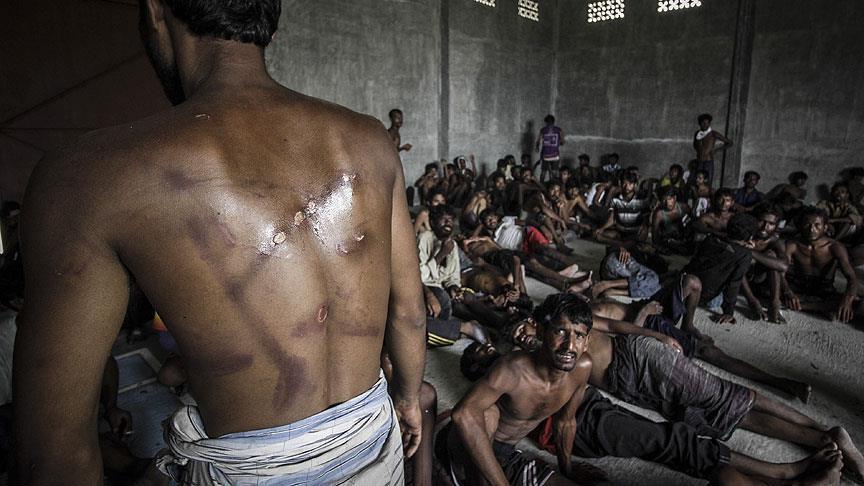State provocation led to Myanmar 'genocide', Rohingya say
European Rohingya Council says government complicit in attacks on police that sparked atrocities

By
ANKARA
A violent security crackdown
Hla Kyaw, chairman of the European Rohingya Council (ERC), said the killings of police in Rakhine State, where most Rohingya live, on Oct. 9 was organized by military intelligence as justification for repressive measures against Rohingya.
“The Myanmar military intelligence department indirectly supported a group of desperate Rohingya youths to create a gang and manipulated them to attack security forces in order to legalize their illegal attack on the community,” he said in an interview conducted at Anadolu Agency’s Ankara office.
“We do not support any kind of violence. We condemn this killing.”
Hla Kyaw said that local villagers informed the police of the gang’s intentions “but police kept silence and did not do anything to stop it.”
He added: “So that means the government is behind this attack in order to justify their actions against Rohingya.”
Nine police officers were killed in attacks on posts in Maungdaw, a district in northern Rakhine near the Bangladesh border. The killings sparked a violent wave of reprisals against the civilian population.
During these operations, the UN and rights groups have produced evidence of widespread abuses by security forces such as killings -- including of children and babies -- gang rape, brutal beatings, the burning of villages and disappearances.
The council said more than 400 people were killed in the crackdown, which officially ended on Feb. 15, and around 400 women were raped, including children aged 12. Approximately 1,500 houses were burnt down, Hla Kyaw said.
During the operations, at least 93,000 people were displaced, with the majority fleeing to Bangladesh, the UN Office for the Coordination of Humanitarian Affairs said.
As well as provoking the attacks against police, Hla Kyaw accused the government of setting the Muslim and Buddhist communities against each other in Rakhine.
Discriminatory laws
“This strategy is coming from the state of Myanmar, from the military institutions,” he said. “Buddhist monks living in the region are spreading Muslim hatred and the state is supporting and using them.”
Hla Kyaw also alleged that the Nasaka border security force that then President Thein Sein ordered disbanded in 2013 was still operating in Rakhine.
The unit was accused of committing serious human rights abuses against Rohingya at the time, as well as enforcing discriminatory laws such as travel and marriage restrictions.
The ERC called for intervention by the international community to stop the “state-run genocide”.
“If you are advocating human rights, if you believe in freedom of religion, then we call you take steps to save women, children and innocent people who have been killed systematically,” Hla Kyaw said.
The Rohingya are not recognized by the government as one of Myanmar’s 135 ethnic groups, which instead claims they are Bengalis originally from Bangladesh.
Hla Kyaw said the Rohingya, who number around 1.3 million in Rakhine, had been persecuted because they were “not same as Burmese in skin color and in religion”.
Aside from the recent crackdown, they have endured decades of repression under Myanmar’s military junta -- forcing many to flee to Bangladesh.
According to the UN High Commission for Refugees, at least 32,000 registered and up to 500,000 unregistered Rohingya were living in Bangladesh in 2015, mostly in Cox’s Bazar.
“They are poor village people,” Hla Kyaw said. “They just working in the fields… What
'Slow-burning genocide'
“Our call to all individuals and organizations -- including rights groups, civil societies, international organizations, the Muslim world and western communities, [all] who believe in human rights and freedom -- you have to stop this before it is too late.”
Research carried out by the International State Crime Initiative at Queen Mary University
Hla Kyaw suggested an international
“It has to be a governmental move,” he told Anadolu Agency. “Regardless of Muslim or non-Muslim governments, it doesn’t matter. They have to stop this by any means necessary.
“You can call it diplomatic or economic sanctions. If they really care about human rights, they need to stop this genocide against the Rohingya people as soon as possible.”
The November 2015 election, which saw a landslide victory for the National League for Democracy led by dissident Aung San Suu Kyi, loosened the military’s 53-year grip on power.
However, further democratization has done little to alleviate the suffering of the Rohingya.
“Suu Kyi doesn’t have any sign of willingness to solve Rohingya issue,” Hla Kyaw said, referring to her as a “racist”.
“She knows very well what’s going on there and she promised to investigate the Rohingya case but she hasn’t done anything about it.”
Hla Kyaw singled out the UN and the Turkish Cooperation and Coordination Agency as groups that had been at the fore of efforts to help the Rohingya, despite restricted access to northern Rakhine.
“The OIC [Organization of Islamic Cooperation] has a responsibility to protect Muslim minorities in non-Muslim countries,” he said. “Turkey especially needs to lead the OIC and international organizations to stop




